Books
A New, Flourishing Literary Scene in the Real Shangri-La
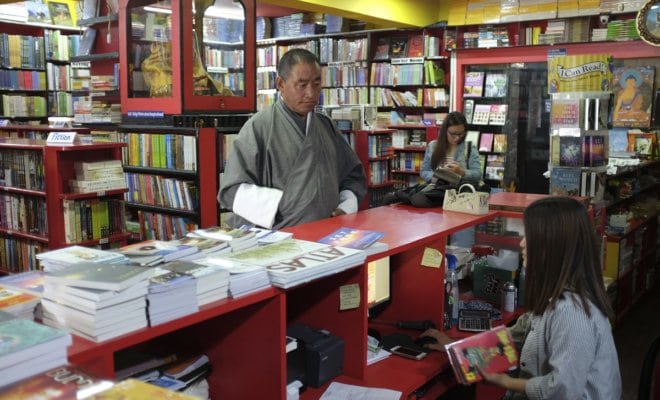
A customer buys a book at DSB Books in Thimphu, which claims to be the oldest bookstore in Bhutan.
Photo: Jeffrey Gettleman/The New York Times
Bhutan may be one of the hardest places to earn a living as a writer. Acharya is considered one of his country’s most talented (all the more impressive considering that he hails from a remote village and his mother can’t read).
Not long ago, when Bhutan’s government tried to enroll children in school, parents hid them in the attic and bribed government agents with butter and cheese to go away. Families needed their children as field hands. The last thing they cared about were books.
But flash forward just a few generations, and the situation in this tiny Himalayan kingdom has changed. Literacy is taking root across these deep green mountain valleys — it’s now around 60 percent, compared to 3 percent in the 1950s — giving rise to a surprising underdog literary scene.
The number of bookshops is increasing; there are around a dozen in the capital, Thimphu, and a few more in far-flung districts. Bhutanese writers are publishing books more than ever before — fantasy novels, poetry, short story collections and especially folklore. Each August, Bhutan hosts an international literary festival in which a handful of big-name authors step off the plane, blinking in the bright alpine light and grinning at how stunningly beautiful this place is. The festival opened this week and includes everything from talks about the importance of bees to a performance by Bhutanese hip-hop dancers.
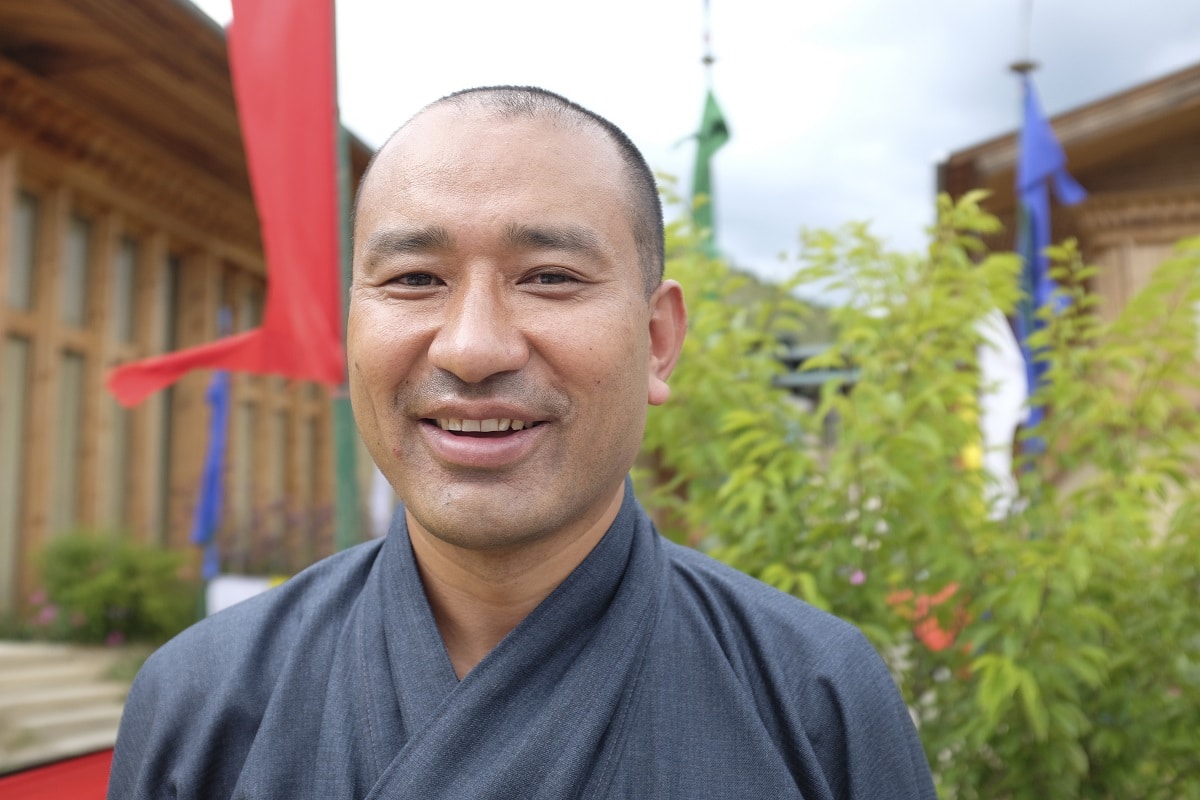
Tshering Tashi, a writer, journalist, tour guide and co-director of the Mountain Echoes Literary Festival, in Thimphu, Bhutan. Photo: Jeffrey Gettleman/The New York Times
For a remote, fragile country of less than 1 million people squeezed between China and India — the world’s two most populous nations — it’s a delicate dance of letting in outsiders without getting steamrollered. Historically, Bhutan has sealed itself off, a Shangri-La nestled in the highest, snow-capped mountain range in the world. Before the 1960s, few foreigners set foot here; it was only in 1999 that television was allowed in.
The old ways are fading — you can see it in the profusion of newly built car dealerships in Thimphu, and in the haze of pollution that hangs over the city, and in the packs of young, unemployed men wearing the traditional gho, a long robe, who have drifted in from the countryside to mill around mobile phone shops, pockets empty, trapped between two worlds.
This new generation of Bhutanese writers and novelists see themselves as occupying a special role: as guardians of their nation’s culture. Many are relatively young, in their 30s and 40s, and love to reminisce about growing up in villages without radios or TVs or even roads, wearing traditional clothes and eating traditional foods (such as hard cubes of yak cheese the size of Starburst candies). They feel an urgency to write about the old ways deep in the mountain villages before that lifestyle totally disappears.
“Create?” asked Tshering Tashi, a writer, journalist, tour guide and co-director of the Mountain Echoes Literary Festival. “That’s a luxury. Our foremost job is to record.”
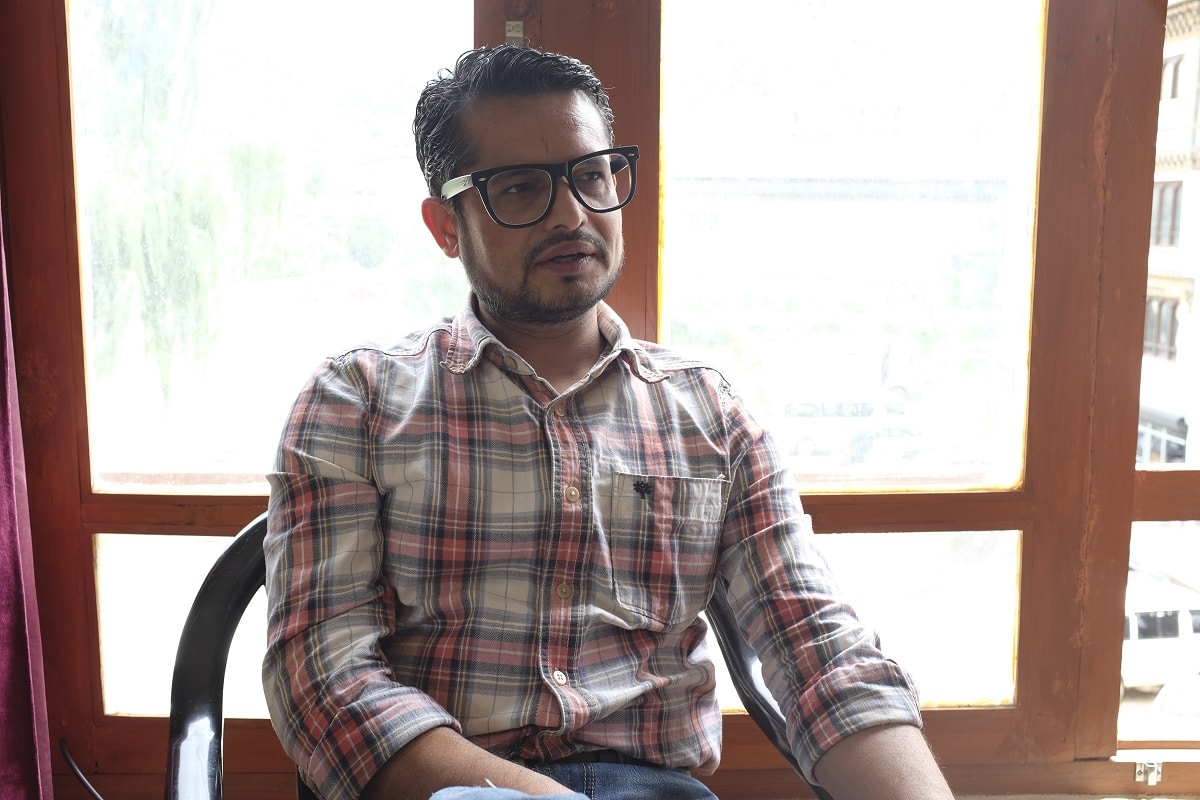
Gopilal Acharya, a Bhutanese poet and author, in Thimphu, Bhutan. Photo: Jeffrey Gettleman/The New York Times
Perhaps it’s unusual for an artist to resist the urge to put something new into the world; it’s like looking up at a glistening mountain and feeling no need to climb it. But in Bhutanese culture, there is not an obsession with conquering things. There’s actually a law that prohibits anyone from climbing the highest mountains because that’s where the deities live, after all.
Tashi, 45, is determined to track down the last of the traditional shamans and spiritual hermits — the custodians of Bhutanese legends — and write their stories, not his, before they take them to the grave. On one mission, he hiked two weeks into the mountains where no roads reach; he finally found his target, an old hermit who had lived by himself for 70 years.
“He was a remarkable man,” Tashi said. “He never got bored.”
So many different Bhutanese writers are open about their sentimentality and their ache to deliver a strong sense of their place to everything they write. Gopilal Acharya, 40, is a poet with dark eyes, a natty beard, crisp plaid shirts and a slightly coiled vibe. He writes in English, like most Bhutanese writers, because that is what he studied in school. (Several indigenous languages are spoken in Bhutan but relatively few books are printed in them.) Raymond Carver is one of his favorite writers.
“I love everything about the man, down to his drinking habits,” Acharya said.
But at the same time, Acharya is passionate about Bhutanese folklore. He wrote a book of children’s tales that celebrate a way of life rooted in isolated hamlets where even today, on windswept mountainsides, people till fields of buckwheat with yoked oxen and wooden plows.
“These stories are how we are anchored as a society,” he said. “We don’t have military or economic power. Our culture is all we have.”
Bhutan may be one of the hardest places to earn a living as a writer. Acharya is considered one of his country’s most talented (all the more impressive considering that he hails from a remote village and his mother can’t read). But he still works as a consultant on sanitation issues.
“I don’t want to be doing fecal management,” he said. “I live to write. But I need to make money.”
Just about all the writers here are self-published and they said they spend several thousand dollars on each book and end up doing everything: the editing, the graphic design, the layout, deliveries, distribution and sales. Bhutan’s handful of publishing houses tend to stick to textbooks, which are far more profitable than novels or story collections.
“Somebody told me that publishing a book is the easiest way to become bankrupt in Bhutan,” joked Monu Tamang, a 20-something novelist.
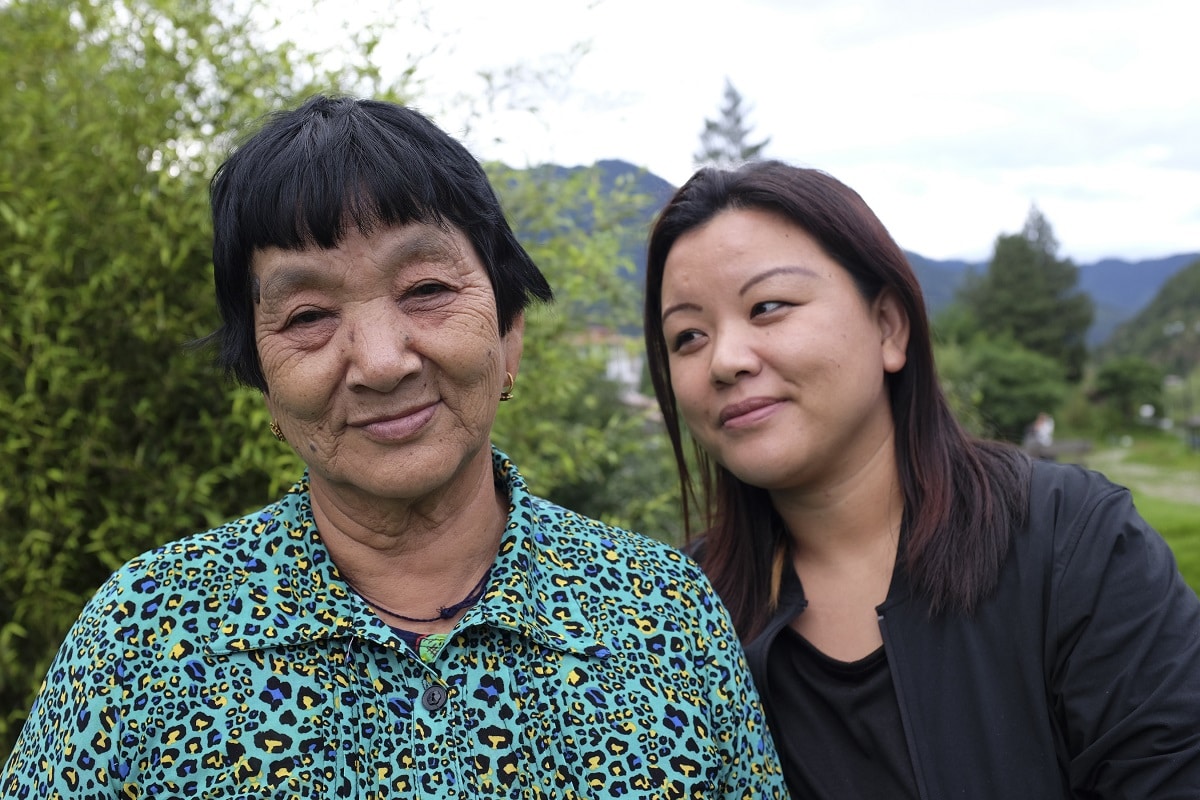
Chador Wangmo, one of Bhutan’s most popular novelists, with her grandmother, Pema Dema, in Thimphu, Bhutan. Photo: Jeffrey Gettleman/The New York Times.
The bookshops tend to stock mass-market paperbacks like entire shelves for Nicholas Sparks. DSB Books, which claims to be Bhutan’s oldest book shop, offers many Asia-themed books, everything from Japanese comics to Buddhist tomes on wisdom. And at the packed little Pe Khang bookstore, titles are arranged in no discernible order. “The Life of Buddha” sits next to “Bob Dylan: The Lyrics 1961- 2012.”
The Bhutanese novels run about $5 a piece, within range of what most can afford. The per capita gross domestic product is equivalent to $9,000, though the Bhutanese government doesn’t get too worked up about these figures. Instead, it prides itself on maximizing gross national happiness.
Every August, the Mountain Echoes festival opens up Bhutan’s literary scene for a brief moment. Dozens of writers from the United States, Europe and other parts of Asia march into the handful of new luxury hotels and mingle with a select few of the Bhutanese intelligentsia at elegant dinners under crystalline skies. The festival is free and audiences tend to be filled with other invited authors, government employees, members of Bhutan’s royal family and lots and lots of schoolchildren.
Last year, some of the events were inspired by local themes like one titled “The Karma of Writing.” Markus Zusak, the author of “The Book Thief” and Padma Lakshmi, the celebrity chef and ex-wife of Salman Rushdie, attracted the biggest crowds.
This year, dozens more writers are scheduled to come; Sarah Kay, a successful American spoken-word poet, is one of the bigger draws. The Bhutanese contingent seem to enjoy the spectacle but most have no urge to leave their kingdom.
“It’s so hectic over there,” Tashi said, referring to the West. He spent three months at Princeton conducting research. “There was never any time for reflection or contemplation.”
Chador Wangmo, one of Bhutan’s favorite novelists, is another quiet nationalist. Some of her fondest memories are from long winters as a child, when the light faded at four in the afternoon and the heavy snows kept schools shut for months and the children sat around the fire, without TVs or radios, listening to the elders’ tales.
“Those stories were our only source of entertainment,” she said.
Wangmo’s books explore old superstitions, like not throwing out the trash at night, juxtaposed with contemporary themes. Her popular novel, “Kyetse,” a word that means something like destiny, is a Dickensian tale of a young woman who is trafficked across Bhutan.
“I can vividly remember the lovely time we used to have as children and already we are losing this huge reserve of rich oral culture,” she said. “The family time and the togetherness is dwindling quicker than we could have fathomed.”
The culture she wants to preserve, she said, revolves around Bhutan’s Buddhist beliefs. “It’s how we sit, how we talk, our dress, our respect for not just humans around us but the whole environment around us.’’
Lately, Wangmo, 38, has interrogated her grandmother, Pema Dema, about all the old stories the elders used to tell around the fire. Dema, well into her 70s, is having trouble remembering them. She also questions why they should be remembered at all.
“There was nothing back then,” she said. There was never enough food, it was so cold, we had no shoes, we walked long distances for water.”
“Today compared to that,” she laughed, “is almost like paradise.”
© New York Times 2018

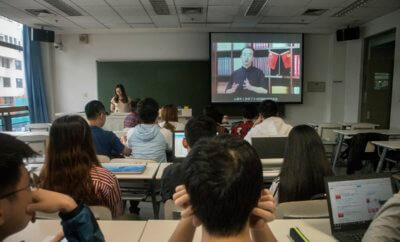


You must be logged in to post a comment Login